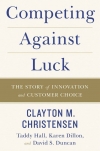新創崛起的致勝核心
《你要如何衡量你的人生》哈佛大學教授克里斯汀生告訴你
「雇用」思維正是無往不利的終極準則
《你要如何衡量你的人生》哈佛大學教授克里斯汀生告訴你
「雇用」思維正是無往不利的終極準則
Amazon、Uber、Airbnb這些平台的旋風式崛起,人們說現在已是新創浪潮的世代。然而在這波搶灘的戰役中並不是所有人都取得了成功,落寞地擱淺於沙灘上的大有人在。究竟新創的成功關鍵是什麼?人們常說嘗試創新就像是賭局,賭大眾的口味,試人們的好惡,真的是這樣嗎?
哈佛大學教授克里斯汀生,繼破壞式創新理論,與夥伴在多年的研究後為你得出了重要的結論:創新的關鍵不在理解顧客;而是理解「顧客的任務customer jobs」。顧客是因為這些需要完成的工作及任務,去「雇用」服務或商品,而非購買。
秉持這個重要的結論,克里斯汀生不僅分析了當今諸多新創企業為何得以成功的緣由,更要告訴你如何預測下一個崛起的成功,而你的企業又能夠如何以依照這個概念,在持續的創新競爭中保持戰鬥力。
結合產業實例與結構清晰完整的理論內容,本書無疑是當下新創浪潮中最重要的一本指引之作。預測下一個浪頭所在,使新創不再是運氣的拼搏,讓你一出手就必勝!(文/博客來編譯)
The foremost authority on innovation and growth presents a path-breaking book every company needs to transform innovation from a game of chance to one in which they develop products and services customers not only want to buy, but are willing to pay premium prices for.
How do companies know how to grow? How can they create products that they are sure customers want to buy? Can innovation be more than a game of hit and miss? Harvard Business School professor Clayton Christensen has the answer. A generation ago, Christensen revolutionized business with his groundbreaking theory of disruptive innovation. Now, he goes further, offering powerful new insights.
After years of research, Christensen and his co-authors have come to one critical conclusion: our long held maxim--that understanding the customer is the crux of innovation--is wrong. Customers don't buy products or services; they ""hire"" them to do a job. Understanding customers does not drive innovation success, he argues. Understanding customer jobs does. The ""Jobs to Be Done"" approach can be seen in some of the world's most respected companies and fast-growing startups, including Amazon, Intuit, Uber, Airbnb, and Chobani yogurt, to name just a few. But this book is not about celebrating these successes--it's about predicting new ones.
Christensen, Hall, Dillon, and Duncan contend that by understanding what causes customers to ""hire"" a product or service, any business can improve its innovation track record, creating products that customers not only want to hire, but that they'll pay premium prices to bring into their lives. Jobs theory offers new hope for growth to companies frustrated by their hit and miss efforts.
This book carefully lays down the authors' provocative framework, providing a comprehensive explanation of the theory and why it is predictive, how to use it in the real world--and, most importantly, how not to squander the insights it provides.












